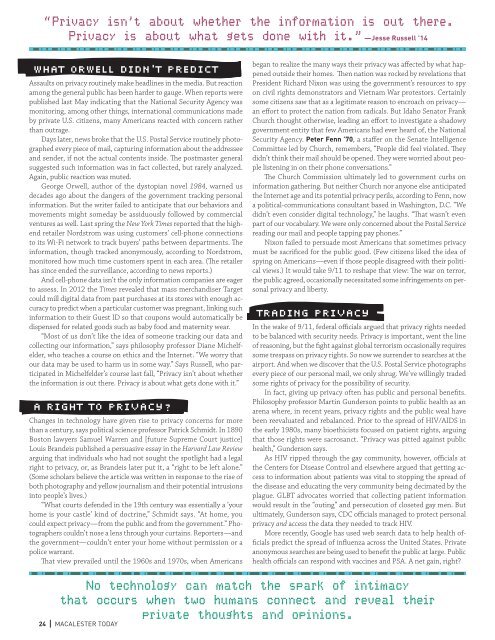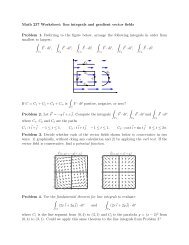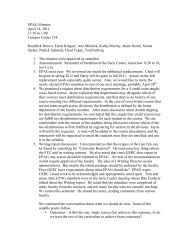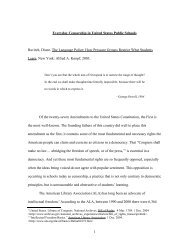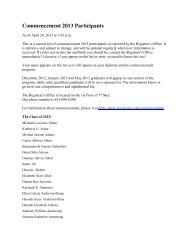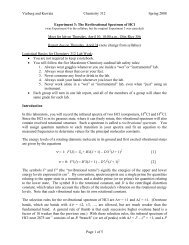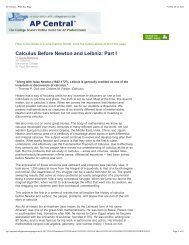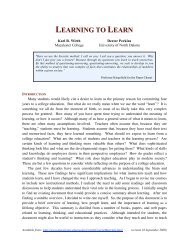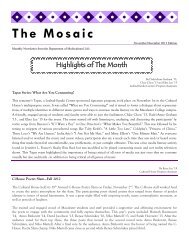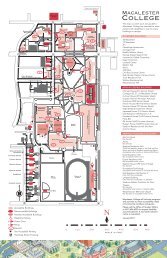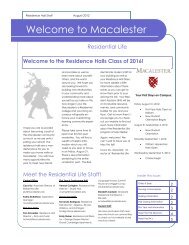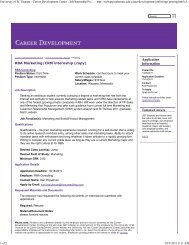Download - Macalester College
Download - Macalester College
Download - Macalester College
Create successful ePaper yourself
Turn your PDF publications into a flip-book with our unique Google optimized e-Paper software.
“Privacy isn’t about whether the information is out there.<br />
Privacy is about what gets done with it.” —Jesse Russell ’14<br />
What Orwell Didn't Predict<br />
Assaults on privacy routinely make headlines in the media. But reaction<br />
among the general public has been harder to gauge. When reports were<br />
published last May indicating that the National Security Agency was<br />
monitoring, among other things, international communications made<br />
by private U.S. citizens, many Americans reacted with concern rather<br />
than outrage.<br />
Days later, news broke that the U.S. Postal Service routinely photographed<br />
every piece of mail, capturing information about the addressee<br />
and sender, if not the actual contents inside. The postmaster general<br />
suggested such information was in fact collected, but rarely analyzed.<br />
Again, public reaction was muted.<br />
George Orwell, author of the dystopian novel 1984, warned us<br />
decades ago about the dangers of the government tracking personal<br />
information. But the writer failed to anticipate that our behaviors and<br />
movements might someday be assiduously followed by commercial<br />
ventures as well. Last spring the New York Times reported that the highend<br />
retailer Nordstrom was using customers’ cell-phone connections<br />
to its Wi-Fi network to track buyers’ paths between departments. The<br />
information, though tracked anonymously, according to Nordstrom,<br />
monitored how much time customers spent in each area. (The retailer<br />
has since ended the surveillance, according to news reports.)<br />
And cell-phone data isn’t the only information companies are eager<br />
to assess. In 2012 the Times revealed that mass merchandiser Target<br />
could mill digital data from past purchases at its stores with enough accuracy<br />
to predict when a particular customer was pregnant, linking such<br />
information to their Guest ID so that coupons would automatically be<br />
dispensed for related goods such as baby food and maternity wear.<br />
“Most of us don’t like the idea of someone tracking our data and<br />
collecting our information,” says philosophy professor Diane Michelfelder,<br />
who teaches a course on ethics and the Internet. “We worry that<br />
our data may be used to harm us in some way.” Says Russell, who participated<br />
in Michelfelder’s course last fall, “Privacy isn’t about whether<br />
the information is out there. Privacy is about what gets done with it.”<br />
A Right to Privacy?<br />
Changes in technology have given rise to privacy concerns for more<br />
than a century, says political science professor Patrick Schmidt. In 1890<br />
Boston lawyers Samuel Warren and [future Supreme Court justice]<br />
Louis Brandeis published a persuasive essay in the Harvard Law Review<br />
arguing that individuals who had not sought the spotlight had a legal<br />
right to privacy, or, as Brandeis later put it, a “right to be left alone.”<br />
(Some scholars believe the article was written in response to the rise of<br />
both photography and yellow journalism and their potential intrusions<br />
into people’s lives.)<br />
“What courts defended in the 19th century was essentially a ‘your<br />
home is your castle’ kind of doctrine,” Schmidt says. “At home, you<br />
could expect privacy—from the public and from the government.” Photographers<br />
couldn’t nose a lens through your curtains. Reporters—and<br />
the government—couldn’t enter your home without permission or a<br />
police warrant.<br />
That view prevailed until the 1960s and 1970s, when Americans<br />
began to realize the many ways their privacy was affected by what happened<br />
outside their homes. Then nation was rocked by revelations that<br />
President Richard Nixon was using the government’s resources to spy<br />
on civil rights demonstrators and Vietnam War protestors. Certainly<br />
some citizens saw that as a legitimate reason to encroach on privacy—<br />
an effort to protect the nation from radicals. But Idaho Senator Frank<br />
Church thought otherwise, leading an effort to investigate a shadowy<br />
government entity that few Americans had ever heard of, the National<br />
Security Agency. Peter Fenn ’70, a staffer on the Senate Intelligence<br />
Committee led by Church, remembers, “People did feel violated. They<br />
didn’t think their mail should be opened. They were worried about people<br />
listening in on their phone conversations.”<br />
The Church Commission ultimately led to government curbs on<br />
information gathering. But neither Church nor anyone else anticipated<br />
the Internet age and its potential privacy perils, according to Fenn, now<br />
a political-communications consultant based in Washington, D.C. “We<br />
didn’t even consider digital technology,” he laughs. “That wasn’t even<br />
part of our vocabulary. We were only concerned about the Postal Service<br />
reading our mail and people tapping pay phones.”<br />
Nixon failed to persuade most Americans that sometimes privacy<br />
must be sacrificed for the public good. (Few citizens liked the idea of<br />
spying on Americans—even if those people disagreed with their political<br />
views.) It would take 9/11 to reshape that view: The war on terror,<br />
the public agreed, occasionally necessitated some infringements on personal<br />
privacy and liberty.<br />
Trading Privacy<br />
In the wake of 9/11, federal officials argued that privacy rights needed<br />
to be balanced with security needs. Privacy is important, went the line<br />
of reasoning, but the fight against global terrorism occasionally requires<br />
some trespass on privacy rights. So now we surrender to searches at the<br />
airport. And when we discover that the U.S. Postal Service photographs<br />
every piece of our personal mail, we only shrug. We’ve willingly traded<br />
some rights of privacy for the possibility of security.<br />
In fact, giving up privacy often has public and personal benefits.<br />
Philosophy professor Martin Gunderson points to public health as an<br />
arena where, in recent years, privacy rights and the public weal have<br />
been reevaluated and rebalanced. Prior to the spread of HIV/AIDS in<br />
the early 1980s, many bioethicists focused on patient rights, arguing<br />
that those rights were sacrosanct. “Privacy was pitted against public<br />
health,” Gunderson says.<br />
As HIV ripped through the gay community, however, officials at<br />
the Centers for Disease Control and elsewhere argued that getting access<br />
to information about patients was vital to stopping the spread of<br />
the disease and educating the very community being decimated by the<br />
plague. GLBT advocates worried that collecting patient information<br />
would result in the “outing” and persecution of closeted gay men. But<br />
ultimately, Gunderson says, CDC officials managed to protect personal<br />
privacy and access the data they needed to track HIV.<br />
More recently, Google has used web search data to help health officials<br />
predict the spread of influenza across the United States. Private<br />
anonymous searches are being used to benefit the public at large. Public<br />
health officials can respond with vaccines and PSA. A net gain, right?<br />
No technology can match the spark of intimacy<br />
that occurs when two humans connect and reveal their<br />
private thoughts and opinions.<br />
24 MACALESTER TODAY


